ABU DHABI // Iraq’s prime minister on Monday arrived in Jeddah on his first trip to the kingdom since taking office, as Riyadh and Baghdad seek to improve ties that have been weak since 2003.
Saudi Arabia is the first stop for Haidar Al Abadi on his three-day visit of the Arabian Gulf that will take him to Kuwait and Iran for talks to ease tensions in the region.
Saudi crown prince Mohammed bin Nayef greeted Mr Al Abadi at Jeddah airport.
The premier was accompanied by senior Iraqi officials, including the foreign minister, intelligence chief and the ministers of industry and agriculture, the Saudi press agency reported.
Mr Al Abadi will hold talks with King Salman, his second meeting with the monarch this year.
The premier’s trip was reportedly delayed by a week to avoid any appearance of siding with Riyadh in the Gulf states’ isolation of Qatar.
Mr Al Abadi said on Saturday that his visit has nothing to do with Saudi Arabia, the UAE and Bahrain’s dispute with Qatar.
Instead, the trip is the latest in a series of recent moves towards rapprochement between Riyadh and Baghdad that the United States have encouraged.
Relations between Iraq and Saudi Arabia have been marginal since Iran gained significant influence in Iraq after the US invasion in 2003 and as Riyadh and Tehran’s rivalry intensified.
But Mr Al Abadi has sought to improve ties with regional neighbours as he seeks to bolster international cooperation on fighting terrorist groups, improving security, and rejuvenating Iraq’s economy after quelling ISIL.
Although Mr Al Abadi is from a Shiite political bloc, his political rivals are from staunchly pro-Iranian factions. As such, he may be looking ahead to next year’s elections and join hands with regional neighbours to counter Tehran’s influence in Iraq.
“We don’t want to be part of any axis,” Mr Al Abadi said before leaving for Jeddah.
“We want to coordinate with these states to continue fighting terrorism.”
The US has supported the premier’s efforts as it seeks to help Mr Al Abadi stabilise Iraq after vanquishing ISIL and to aid GCC allies in countering Iran’s influence across the Middle East.
In February, Saudi foreign minister Adel Al Jubeir made the first visit by a senior Saudi official to Baghdad since 1990.
In March, King Salman and Mr Al Abadi met on the sidelines of an Arab League summit.
Last month, Saudi oil minister Khalid Al Falih visited Baghdad for talks on cutting oil production as part of the kingdom’s push to bolster crude prices.
tkhan@thenational.ae

